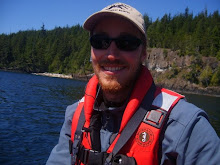
Many of you were likely surprised to see an article in the Globe and Mail this past Sunday that cited a recent study by world-renown climate scientist, Dr. Andrew Weaver, on the impact on global warming of the Alberta tar sands vs. the world's coal reserve. Surprised that is, because the article left the impression that Dr. Weaver's work gives carte blanches to unrestricted oil development in Canada.
It would be a huge mistake to interpret our results as some kind of a "get out of jail free" card for the tar sands. While coal is the greatest threat to the climate globally, the tar sands remain the largest source of greenhouse gas emission growth in Canada and are the single largest reason Canada is failing to meet its international climate commitments and failing to be a climate leader. The world needs to transition away from fossil fuels if it wants to avoid dangerous human interference with the climate system. That means coal, unconventional gas, and unconventional oil all need to be addressed.
350.org founder, Bill McKibben, aptly points out that this study is possibly the "Least Reassuring Reassurance of All Time". I found the analogy he uses particularly appropriate:
Today’s study is akin to saying: 'True, smoking six packs a day is going to kill you. But if you want to make certain you die, smoke a hundred packs a day. And if you really want to make sure you die tomorrow, lie down in front of a train.'
Dr. Weaver reiterated this sentiment both in his interview on CBC's The Current on Monday (listen to the full interview here) and in an article for the Huffington Post (horrible title notwithstanding) on Tuesday. In the Huffington Post article, he provides further clarification:
Does our study mean that I am in favour of the proposed Northern Gateway pipeline in northern British Columbia? No. For the record, I am strongly opposed to it for four reasons:
1. We are shipping our natural resource offshore instead of ensuring energy security in North America.
2. The pipeline would go through the world's last great temperate rainforest that should be protected.
3. Tanker traffic along the BC coast is an accident waiting to happen as the waters are hazardous to navigate. Environmental destruction would be profound when a spill occurred.
4. Virtually every First Nation is opposed to the project. The Northern Gateway pipeline would go through their traditional land and their wishes must be respected.
Of course, the risks associated with shipping tankers full of toxic bitumen across one of the most dangerous stretches of water in the world is another post in itself (one that has already been written, in fact).
Alarmingly, a recent BBC article suggests that the same freedom is not being granted to federal government scientists in Canada, especially those who work on environmental issues. Interestingly enough, Dr. Weaver is quoted here as well:
You can't have an informed discussion if the science isn't allowed to be communicated. Public relations message number one is that you have to set the conversation. You don't want to have a conversation on someone else's terms. And this is now being applied to science on discussions about oil sands, climate and salmon.

No comments:
Post a Comment